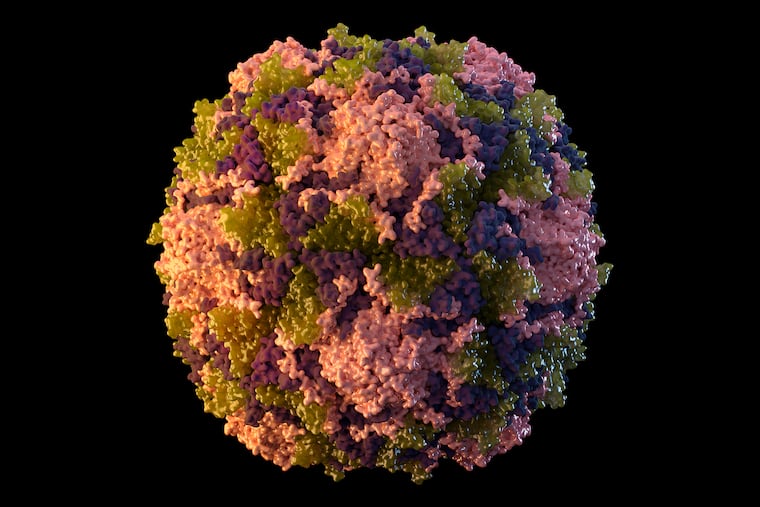Polio detected in New York City’s sewage, suggesting virus circulation
Health officials say it is possible that hundreds of people in New York state have gotten polio and don’t know it.

NEW YORK — The virus that causes polio has been found in New York City’s wastewater in another sign that the disease, which hadn’t been seen in the U.S. in a decade, is quietly spreading among unvaccinated people, health officials said Friday.
The presence of the poliovirus in the city’s wastewater suggests likely local circulation of the virus, health authorities from the city, New York state and the federal government said.
The authorities urged parents to get their children vaccinated against the potentially deadly disease.
“The risk to New Yorkers is real but the defense is so simple — get vaccinated against polio,” New York City Health Commissioner Dr. Ashwin Vasan said. “With polio circulating in our communities there is simply nothing more essential than vaccinating our children to protect them from this virus, and if you’re an unvaccinated or incompletely vaccinated adult, please choose now to get the vaccine. Polio is entirely preventable and its reappearance should be a call to action for all of us.”
» READ MORE: Polio virus found in New York wastewater, but no new cases
Dr. José R. Romero, director of the Centers for Disease Control and Prevention’s National Center for Immunization and Respiratory Diseases, said, “This is sobering; we know polio spreads silently, and it’s likely that there are many people infected with polio and shedding the virus in these communities. This is also an urgent and living reminder of the importance of vaccination.”
New York City is being forced to confront polio as city health officials are struggling to vaccinate vulnerable populations against monkeypox and adjusting to changing COVID-19 guidelines.
“We are dealing with a trifecta,” Mayor Eric Adams said Friday on CNN. “COVID is still very much here. Polio, we have identified polio in our sewage, and we’re still dealing with the monkeypox crisis. But the team is there. And we’re coordinating and we’re addressing the threats as they come before us, and we’re prepared to deal with them with the assistance of Washington, D.C.”
The announcement about the discovery of the polio virus in New York City comes shortly after British health authorities reported finding evidence the virus has spread in London but found no cases in people. Children ages 1-9 in London were made eligible for booster doses of a polio vaccine Wednesday.
In New York, one person suffered paralysis weeks ago because of a polio infection in Rockland County, north of the city. Wastewater samples collected in June in both Rockland and adjacent Orange County were found to contain the virus.
CDC officials said the virus identified in wastewater samples collected in New York City did not contain enough genetic material to determine if they were linked to the Rockland County patient.
Most people infected with polio have no symptoms but can still give the virus to others for days or weeks. Vaccination offers strong protection, and authorities urged people who haven’t gotten the shots to seek one immediately.
Based on past outbreaks, it is possible that hundreds of people in the state have gotten polio and don’t know it, officials said.
Polio was once one of the nation’s most feared diseases, with annual outbreaks causing thousands of cases of paralysis. The disease mostly affects children.
Vaccines became available starting in 1955, and a national vaccination campaign cut the annual number of U.S. cases to less than 100 in the 1960s and fewer than 10 in the 1970s, according to the Centers for Disease Control and Prevention.
A small percentage of people who contract polio suffer paralysis. The disease is fatal for 5-10% of those paralyzed.
All schoolchildren in New York are required to have a polio vaccine, but Rockland and Orange counties are both known as centers of vaccine resistance.
According to the CDC’s most recent childhood vaccination data, about 93% of 2-year-olds had received at least three doses of polio vaccine. But the rate is only 80% in New York state, and is far lower in the area around where the polio case was reported — just 60% in Rockland County and 59% in Orange County, according to state data.
While health officials across the board are urging the unvaccinated to get the shots immediately, Dr. William Schaffner, an infectious disease expert at Vanderbilt University, said there is currently no evidence that a booster campaign such as London’s is needed in New York City or elsewhere in the U.S.
“Polio vaccine, given in infancy, should have rather long-term protection,” he said.